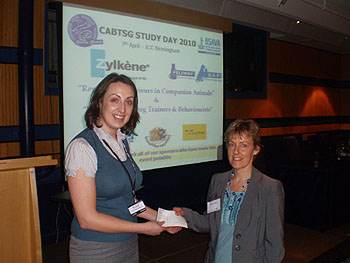Awards For Pheromone Therapy Students
 16 years ago
16 years ago  4688 views
4688 views
Posted
10th June, 2010 00h00
 A cheque for £1,000 was presented to Sarah in recognition of her research into the use of D.A.P. to treat a dog with generalised fear of leaving her home environment.
Second prize and a cheque for £500 went to veterinary nurse, Laura Bailey from Kinver Veterinary Practice in Kinver, Stourbridge, for her study into reducing anxiety and re-directed aggression in a multi-cat household with the use of Felifriend. Sarah Fowler from Highfield Veterinary Surgery in Broxbourne, Hertfordshire, also a veterinary nurse, was awarded third prize and a cheque for £250 for her research into the use of D.A.P. in a dog with suspected separation anxiety.
The University of Lincoln launched the country’s first accredited course in pheromone therapy in 2007 to help increase the veterinary profession’s understanding of stress and its potential to trigger behavioural issues in pets. The distance learning course, which is supported by CEVA Animal Health, is aimed at veterinary surgeons, veterinary nurses and behaviourists and comprises 12 audio visual tutorials covering pheromone therapy and its applications in companion animals which can be undertaken at a pace to suit individual students.
For further information, please contact the University of Lincoln on 01522 882000 or log on to www.lincoln.ac.uk.
A cheque for £1,000 was presented to Sarah in recognition of her research into the use of D.A.P. to treat a dog with generalised fear of leaving her home environment.
Second prize and a cheque for £500 went to veterinary nurse, Laura Bailey from Kinver Veterinary Practice in Kinver, Stourbridge, for her study into reducing anxiety and re-directed aggression in a multi-cat household with the use of Felifriend. Sarah Fowler from Highfield Veterinary Surgery in Broxbourne, Hertfordshire, also a veterinary nurse, was awarded third prize and a cheque for £250 for her research into the use of D.A.P. in a dog with suspected separation anxiety.
The University of Lincoln launched the country’s first accredited course in pheromone therapy in 2007 to help increase the veterinary profession’s understanding of stress and its potential to trigger behavioural issues in pets. The distance learning course, which is supported by CEVA Animal Health, is aimed at veterinary surgeons, veterinary nurses and behaviourists and comprises 12 audio visual tutorials covering pheromone therapy and its applications in companion animals which can be undertaken at a pace to suit individual students.
For further information, please contact the University of Lincoln on 01522 882000 or log on to www.lincoln.ac.uk.More from
- Animus launches SkinBond Multi for enhanced wound care
- IVC Evidensia reports 82% cut in Farm antibiotic use and 20% carbon emissions reduction
- Vet professionals flock to sign up to transformative locum platform
- The ProSalus Foundation launches urgent appeal for UK vets to support Ukrainian colleagues
- Vetsure Named Business of the Year at 2025 SME National Business Awards


 11 hours ago
11 hours ago